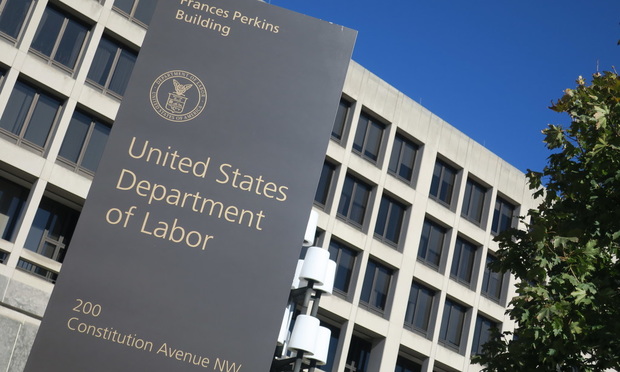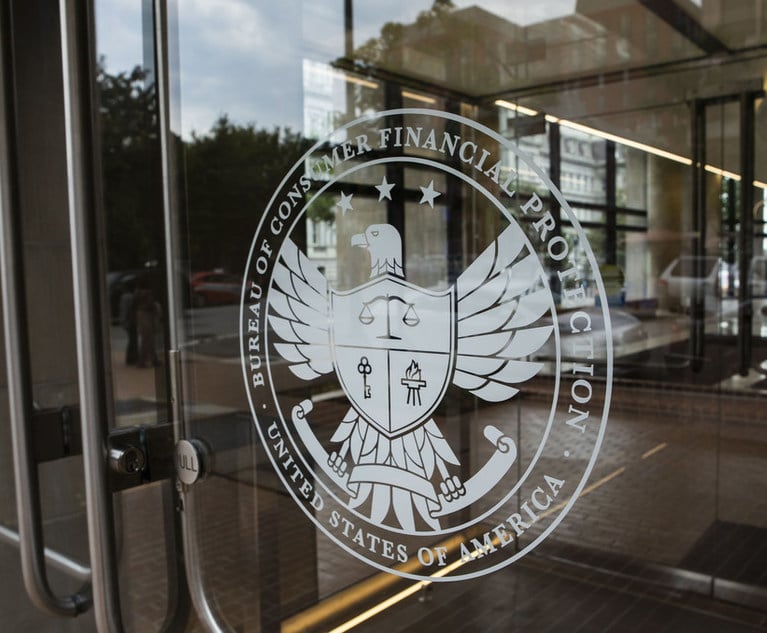Former Morgan Stanley Lawyer's Retaliation Complaint Is Dismissed
The ruling against Christopher Garvey, formerly among Morgan Stanley's top lawyers in Hong Kong, was the latest decision exploring the contours of anti-retaliation provisions of the Sarbanes-Oxley Act of 2002.
February 21, 2020 at 11:13 AM
6 minute read
 U.S. Labor Department headquarters in Washington, D.C. (Photo: Mike Scarcella / ALM)
U.S. Labor Department headquarters in Washington, D.C. (Photo: Mike Scarcella / ALM)
A retaliation claim brought by a former Morgan Stanley in-house lawyer who was based at a subsidiary in Hong Kong falls outside the scope of a federal corporate fraud law that more broadly protects domestic whistleblowers, a U.S. Labor Department judge said in a new order that embraces earlier decisions limiting the reach of the statute.
The ruling against Christopher Garvey, formerly among Morgan Stanley's top lawyers in Hong Kong, was the latest decision exploring the contours of anti-retaliation provisions of the Sarbanes-Oxley Act of 2002. Garvey alleged Morgan Stanley leaders forced him out after he raised concerns about alleged foreign bribery and securities regulations. The company has denied the allegations.
The evidence in Garvey's complaint, filed in 2016 at the Labor Department, shows he "worked entirely outside of the United States," Francine Applewhite, an administrative law judge in Washington, said in her ruling dismissing the claims. Where an employee works, the judge said, "is the key factor to consider when deciding whether a claim is a domestic or extraterritorial application" of the Sarbanes-Oxley Act's whistleblower protections.
Applewhite's ruling, dated Feb. 13, did not confront the merits of Garvey's contention that Morgan Stanley took adverse employment actions against him in response to raising concerns about alleged misconduct. Garvey was not reached for comment Thursday.
Representatives for Morgan Stanley, including a spokesperson and a lawyer who advocated for the bank at the Labor Department, did not return messages seeking comment. Morgan Stanley was represented by Morgan, Lewis & Bockius partner Sara Bouchard, who is based in Philadelphia and serves as the co-leader of the firm's whistleblower group.
Administrative law judges at the Labor Department routinely hear whistleblower complaints alleging financial fraud and other improprieties at major U.S. companies. The Occupational Safety and Health Administration, a component of the Labor Department, enforces whistleblower provisions of the Sarbanes-Oxley Act.
In fiscal year 2019, the Labor Department received 125 complaints under the Sarbanes-Oxley Act. Section 806 of the Sarbanes-Oxley Act outlines broad whistleblower protections accorded to employees of publicly traded companies. In one case, Wells Fargo Bank N.A. in 2017 was ordered to pay $5.4 million in back pay, damages and legal fees in 2017.
No global reach
Applewhite's decision embraced two recent rulings from the Labor Department's administrative review board, an appellate body that examines decisions by the agency's administrative law judges. The two rulings—Hu v. PTC Inc. and Perez v. Citigroup Inc., issued in September and addressing claims from employees who were based in China and Mexico, respectively—said Sarbanes-Oxley protections do not have global reach.
Littler Mendelson shareholder A. Michael Weber represented Citigroup, and Kathleen Kundar of New York's Fox Horan & Camerini represented Antonio Perez. Neither lawyer was reached for comment Thursday.
The other ruling confronted claims brought by Hu Li Tao, who was a sales employee in China at a subsidiary of the Massachusetts-based computer software company PTC. Hu, representing himself, argued the U.S. parent company controlled hiring and terminating decisions. PTC was represented by David Rubin of Boston's Nutter McClennen & Fish.
A whistleblower complaint under Section 806 of the Sarbanes-Oxley Act "does not become territorial because the alleged misconduct occurred in the U.S., or because it had, or would have, effects on U.S. securities markets, or because the alleged retaliatory decision was made in the United States," the labor appeals board wrote in the PTC case.
Rubin, a Nutter litigation partner, said the decision in Garvey's case "applies what is now the clear caselaw; namely, that an employee who works outside of the U.S. for a foreign subsidiary of a U.S. company cannot bring a retaliation claim" under Section 806 of the Sarbanes-Oxley Act.
Rubin said an earlier labor appeals board decision, from 2017, caused some uncertainty about the scope of whistleblower protections under Sarbanes-Oxley. That case involved claims arising from alleged misconduct at an American military base in Afghanistan. The court found a contractor could allege retaliation because a U.S. base located overseas is still considered U.S. territory.
"Section 806 does not apply extraterritorially," Rubin said. "The rationale is that Section 806 regulates employment in the U.S. It does not regulate employment in foreign countries."
Sign up here for Law.com's weekly dispatch Labor of Law
Garvey joined Morgan Stanley Japan Group Co. Ltd. in 2006, and he later worked at Morgan Stanley Asia Limited, in Hong Kong, after the Fukushima earthquake in 2011. He argued the labor appeals board decisions in the PTC and Citigroup cases "did not change the law, much less so in the way that Morgan Stanley's submissions seek to convince the court." Garvey argued that leaders in Morgan Stanley's headquarters in New York made decisions in response to his retaliation claim.
In his complaint, Garvey, who at one time oversaw the bank's merchant banking and real estate investment in Asia, said he became aware "in early 2015 … that Morgan Stanley was engaged in conduct in violation of the U.S. Foreign Corrupt Practices Act and other U.S. securities laws." The "engagement of a consultant in India [gave] rise to potential corruption related concerns," according to filings in Garvey's case.
He said he "objected to these practices repeatedly and strenuously, first by advising the individuals involved not to pursue their proposed course of action and, when that failed, by escalating the issue to senior management." He said in his complaint: "The company did not heed the warnings and instead chose to conceal the wrongdoing and to protect the individuals responsible for the illegal conduct."
Morgan Stanley, according to Labor Department records, said Garvey left the bank voluntarily after he grew dissatisfied with his salary. The bank also said it gave Garvey a positive performance review and a $122,540 bonus in 2015, the second largest awarded to the 23 executive directors in the bank's Asia Pacific legal department.
Read more:
Ex-Morgan Stanley Lawyer Alleges Retaliation After Raising Corruption Concerns
Former KPMG Director Claimed He Was Fired After Questioning Audit Staffing
Oracle, Suing US Labor Dept., Accuses Agency Enforcer of 'Power Grab'
This content has been archived. It is available through our partners, LexisNexis® and Bloomberg Law.
To view this content, please continue to their sites.
Not a Lexis Subscriber?
Subscribe Now
Not a Bloomberg Law Subscriber?
Subscribe Now
NOT FOR REPRINT
© 2025 ALM Global, LLC, All Rights Reserved. Request academic re-use from www.copyright.com. All other uses, submit a request to [email protected]. For more information visit Asset & Logo Licensing.
You Might Like
View All
SEC Official Hints at More Restraint With Industry Bars, Less With Wells Meetings
4 minute read
CFPB Resolves Flurry of Enforcement Actions in Biden's Final Week

Wells Fargo and Bank of America Agree to Pay Combined $60 Million to Settle SEC Probe
Trending Stories
- 1Uber Files RICO Suit Against Plaintiff-Side Firms Alleging Fraudulent Injury Claims
- 2The Law Firm Disrupted: Scrutinizing the Elephant More Than the Mouse
- 3Inherent Diminished Value Damages Unavailable to 3rd-Party Claimants, Court Says
- 4Pa. Defense Firm Sued by Client Over Ex-Eagles Player's $43.5M Med Mal Win
- 5Losses Mount at Morris Manning, but Departing Ex-Chair Stays Bullish About His Old Firm's Future
Who Got The Work
J. Brugh Lower of Gibbons has entered an appearance for industrial equipment supplier Devco Corporation in a pending trademark infringement lawsuit. The suit, accusing the defendant of selling knock-off Graco products, was filed Dec. 18 in New Jersey District Court by Rivkin Radler on behalf of Graco Inc. and Graco Minnesota. The case, assigned to U.S. District Judge Zahid N. Quraishi, is 3:24-cv-11294, Graco Inc. et al v. Devco Corporation.
Who Got The Work
Rebecca Maller-Stein and Kent A. Yalowitz of Arnold & Porter Kaye Scholer have entered their appearances for Hanaco Venture Capital and its executives, Lior Prosor and David Frankel, in a pending securities lawsuit. The action, filed on Dec. 24 in New York Southern District Court by Zell, Aron & Co. on behalf of Goldeneye Advisors, accuses the defendants of negligently and fraudulently managing the plaintiff's $1 million investment. The case, assigned to U.S. District Judge Vernon S. Broderick, is 1:24-cv-09918, Goldeneye Advisors, LLC v. Hanaco Venture Capital, Ltd. et al.
Who Got The Work
Attorneys from A&O Shearman has stepped in as defense counsel for Toronto-Dominion Bank and other defendants in a pending securities class action. The suit, filed Dec. 11 in New York Southern District Court by Bleichmar Fonti & Auld, accuses the defendants of concealing the bank's 'pervasive' deficiencies in regards to its compliance with the Bank Secrecy Act and the quality of its anti-money laundering controls. The case, assigned to U.S. District Judge Arun Subramanian, is 1:24-cv-09445, Gonzalez v. The Toronto-Dominion Bank et al.
Who Got The Work
Crown Castle International, a Pennsylvania company providing shared communications infrastructure, has turned to Luke D. Wolf of Gordon Rees Scully Mansukhani to fend off a pending breach-of-contract lawsuit. The court action, filed Nov. 25 in Michigan Eastern District Court by Hooper Hathaway PC on behalf of The Town Residences LLC, accuses Crown Castle of failing to transfer approximately $30,000 in utility payments from T-Mobile in breach of a roof-top lease and assignment agreement. The case, assigned to U.S. District Judge Susan K. Declercq, is 2:24-cv-13131, The Town Residences LLC v. T-Mobile US, Inc. et al.
Who Got The Work
Wilfred P. Coronato and Daniel M. Schwartz of McCarter & English have stepped in as defense counsel to Electrolux Home Products Inc. in a pending product liability lawsuit. The court action, filed Nov. 26 in New York Eastern District Court by Poulos Lopiccolo PC and Nagel Rice LLP on behalf of David Stern, alleges that the defendant's refrigerators’ drawers and shelving repeatedly break and fall apart within months after purchase. The case, assigned to U.S. District Judge Joan M. Azrack, is 2:24-cv-08204, Stern v. Electrolux Home Products, Inc.
Featured Firms
Law Offices of Gary Martin Hays & Associates, P.C.
(470) 294-1674
Law Offices of Mark E. Salomone
(857) 444-6468
Smith & Hassler
(713) 739-1250









